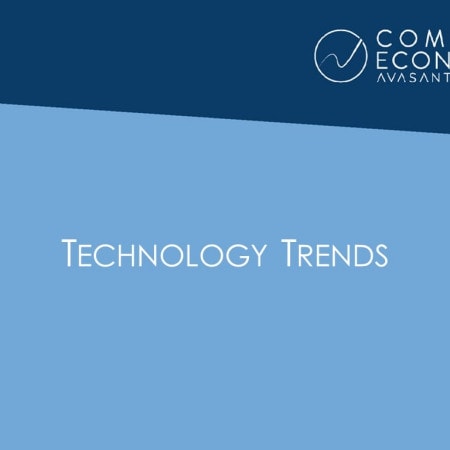-

Supply Chains Need Management to Improve ROI (July 2002)
New technologies that allow real-time information sharing within and across enterprises make supply-chain management possible, but management practices and incentive systems often fail to keep pace. In particular, incentives that reward a part of the process, rather than rewarding end-to-end value creation, prevent businesses from getting the best out of their supply chains according to a Bain & Company study released in May 2002.
July, 2002
-

Emphasize Storage Management Over Storage Capacity (July 2002)
With disk storage only costing about 5 cents per megabyte, many IT managers fall into the trap of believing that increasing capacity is the economical way to go. These managers fail to realize that the management, operation, and maintenance of those disks will annually cost them 50 cents per megabyte or more.
July, 2002
-

XML Takes on New Web Services Roles (July 2002)
The need to tie IT systemsâfrom backend files through front-end securityâtogether in order to build web service engines is driving a number of parallel efforts, all of which employ XML as the binding glue. The potential of XML to allow disparate vendors and suppliers to integrate their e-commerce sites is being realized by the formulation of a variety of standards and the implementation of products based on those standards.
July, 2002
-

SPC-1 Storage Performance Benchmark (July 2002)
In 2001 the Storage Performance Council (SPC) announced SPC-1, the first industry-standard benchmark for enterprise storage systems. This benchmark specification is designed to give users a clearly applicable, vendor-neutral process to accurately compare and configure direct attach or network storage technology.
June, 2002
-

Asynchronous Transfer Mode (ATM) Update (June 2002)
Sometimes referred to as cell relay, ATM uses short, fixed-length packets called cells for transport. Information is divided among these cells, transmitted, and then reassembled at their final destination. ATM consists of a series of layers.
June, 2002
-

June 2002 Web Bites (June 2002)
A recent study by Vividence Corporation reveals that exposure to effective pharmaceutical websites increases consumers' likelihood to request specific prescription drugs from their doctors by 89%.
June, 2002
-

Instant Messaging Turns on Developers (June 2002)
According to the new Evans Data Winter 2002 Wireless Developers Survey, messaging has overtaken email as the most popular application, with almost half of all wireless developers developing messaging applications. These messaging applications include Instant Messaging (IM), SMS, and Unified Messaging. The interviews with developers who are actively engaged in wireless applications also found that the pace of wireless development continues to accelerate. The percentage of respondents who will devote 50% or more of their time to wireless applications will increase from 19% to 24% since the last Evans survey six months ago.
June, 2002
-

Cost Per Image of Digital Printers Varies With Purchase Method (June 2002)
Networked digital printers can provide considerable convenience and versatility to meet an organizationâs printing requirements. Selecting the printer that best meets these requirements can be a challenge in itself.
June, 2002
-

Household Spending for Wireless and Internet Connectivity Rises (June 2002)
Despite a downturn in the overall economy in 2001, the average U.S. household increased its total telecommunications spending by 8%, according to a market information company, Taylor Nelson Sofres (TNS). Overall, expenditures for wireless and Internet increased significantly, up 16% and 20% in the fourth quarter of 2001, while toll and long distance services dropped sharply, down 13% and 15% respectively.
June, 2002
-

Microsoft Focuses Strategy on the Web (June 2002)
While Microsoft may be rethinking its net services strategy, the company will undoubtedly move into this arena. The additional distractions of the departure of its president and still unresolved antitrust lawsuits have failed to deter Microsoft from its primary objective of becoming the major player in the web services market.
June, 2002
-

Deep Linking Lingers On (Jun 2002)
One of the most fundamental characteristics of the Internet, perhaps the one feature which defines the vast, interconnected array of communications and computer systems, is the ability to direct users seamlessly from one point to another. That feature is generically referred to as "linking." Linking takes many forms, and depending on such factors as the content, the context, and the relationship between the two sites involved, the practice gives rise to many legal issues and several unresolved questions.
June, 2002
-

SAP Opens Up and Moves Down Market (June 2002)
Though it may seem longer, especially if you have been personally involved in implementing R/3, SAP AG released its premier ERP suite just ten years ago. Among the painful lessons that R/3 users have learned during that time is that enterprise-level applications rippled through the entire fabric of an organization and took much longer to roll out than expected. But the costs and effort required were often rewarded by major gains in competitive advantage and entry into new marketplaces.
June, 2002
-

Normalization of U.S. Spending Patterns Could Boost Home PC Sales (May 2002)
Consumer optimism and comfort levels edged out financial insecurity and worries about the recession, layoffs, and Osama bin Laden, according to a national survey of 1,000 Americans released in April 2002.
May, 2002
-

Will the Cost of Database Licensing Rise? (April 2002)
Does the software you sell, or the software you buy, rely upon a database of "public" information, or a compilation of facts? Examples of such databases could include lists of names and addresses, geographic information, or statistical compilations. Whether you are the licensor or the licensee, you have probably taken for granted the free use of this information. The adage that "nothing is free," however, may prove true in the realm of database licensing as well. If you incorporate such data into your company's products, this could mean increased licensing overhead, and if you use such software, you may expect this expense to be passed on to you by your vendor.
May, 2002

 Grid View
Grid View List View
List View